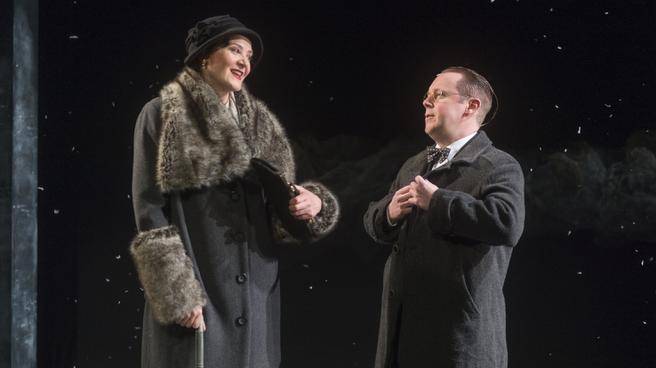carmen grant & colin furlong
Artistic Fraud of Newfoundland’s The Colony of Unrequited Dreams, now playing in Halifax at Neptune Theatre, is an adaptation by Robert Chafe from Wayne Johnston’s 1998 novel of the same name. It is a work of historical fiction, which imagines the real-life Joe Smallwood, sometimes called “The Last Father of Confederation,” interwoven in the life of a fictional Sheilagh Fielding, an ambitious and cutting political journalist, against the backdrop of the fall of the Dominion of Newfoundland.
There are so many beautiful layers to Chafe’s play. At its core, it is about the relationship between two very complex human beings, Fielding and Smallwood. Fielding is a pioneering, entrepreneurial woman, who is also an alcoholic battling deep secrets and intense emotional struggles. Carmen Grant creates a true force of nature in this deeply flawed woman, whose writing talent and tenacity to survive in a man’s world is, nevertheless, inspiring. Colin Furlong plays Smallwood, the scrappy underdog, as a man continually trying to do the right thing, but who often finds he’s accidentally screwed something up. There is a bit of a hapless Rick Moranis in Furlong’s portrayal of Smallwood, which ensures that even when all the odds are stacked against him, we’re still rooting for him to succeed.
Chafe’s characters also beautifully mirror the political landscape in Newfoundland in the years between 1927 and 1948. Smallwood is the perpetual idealist. He begins as a passionate Socialist advocating for Newfoundland’s poorest residents. He believes, earnestly, that he is working in the best interest of the working class, and that there is reason for hope among Depression and possibility among War, and he latches on to Confederation with Canada as a testament to that promise. Sheilagh Fielding, on the other hand, is the cold voice of Cynicism. As a journalist she criticizes all sides of the political spectrum. In her column hope and idealism are sneered at and dismissed as naive. She views Newfoundland with a hard sense of fatalistic doom. Both represent a clash of two prevalent viewpoints. In a similar way, Fielding is Cosmopolitan and worldly; she writes with scathing wit and academic sophistication, catering to a certain audience, largely centred in St. John’s. Smallwood reaches a different demographic in focusing on the Island’s folklore on The Barrelman, his radio program. It then becomes clear that the future of Newfoundland’s nationhood is divided along these same geographical and economic lines.
Although this play is set in the 20th Century, it is timely to see a story of politicians being beleaguered by a free press; one might even charge Fielding with printing “Fake News.” Although, it was the scene where three men sit at a typewriter intent on destroying the career of a female journalist, to shut her up and to break her, that I found most eerily reminiscent of our own time. It reminded me of the Twitter war against Leslie Jones after Ghostbusters was released and of Donald Trump’s inexcusable treatment of Megyn Kelly. In that moment, Sheilagh Fielding was Everywoman who dares to push the boundaries for women, and who dares to express herself in print.
The cast is uniformly excellent. Furlong and Grant both give formidable, deeply nuanced and heartrending performances. Steve O’Connell and Alison Woolridge shine dramatically as Smallwood’s parents, Charlie and Minnie, embroiled in domestic troubles of their own.
Jillian Keiley directs the piece with a beautiful, continuous sense of movement, and of time, and perpetual snow, that clearly propels the audience through this truly epic era of Newfoundland history. The sets and props are minimal, which gives Keiley the freedom to take us anywhere in a moment and the stage effortlessly transitions between scenes with ten actors (large by Canadian standards), to much more intimate moments with just Fielding or just Smallwood.
I am ashamed to admit that I didn’t know very much at all about the history of Newfoundland, beyond that she joined Canada in 1948, until I saw this play. Its history is far more dramatic than I realized, and I was truly riveted throughout, not knowing how the demise of the Dominion of Newfoundland was going to play out. It is so important that we tell these stories and also that we take them out of our Communities and share them with those who live elsewhere in the country, and beyond. I feel enriched in my new knowledge of how Newfoundland came to join the Dominion of Canada, and to learn so much while being so thoroughly entertained and moved, is really the best the theatre can ask for.
The Colony of Unrequited Dreams plays on Neptune Theatre’s Fountain Hall Stage in Halifax (1593 Argyle Street) until March 12. Show times are Tuesdays to Sundays, 7:30 p.m., with matinees at 2 p.m. Saturday and Sunday. Tickets range in price from $33 to $70 and are available here.






 World Theatre Day: My God Is It Ever The Time to Invest in Canadian Plays
World Theatre Day: My God Is It Ever The Time to Invest in Canadian Plays 